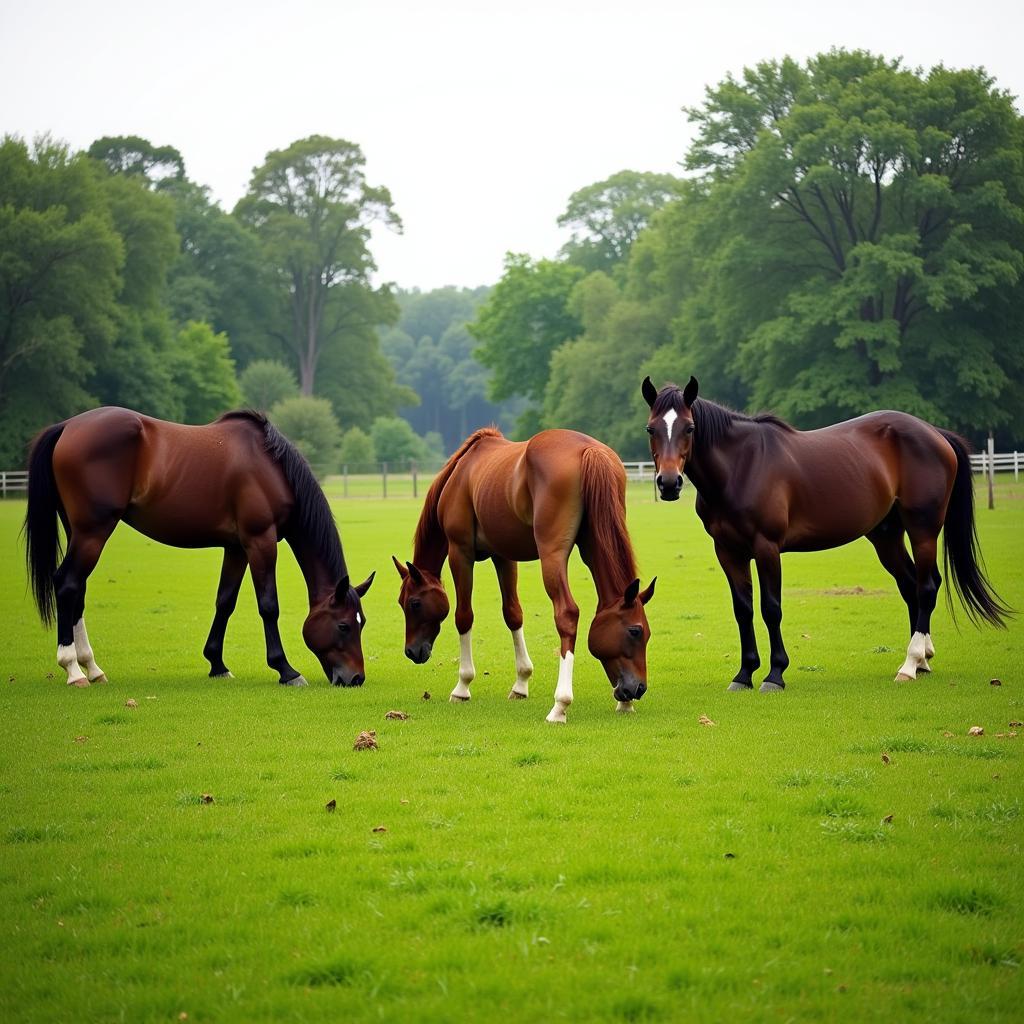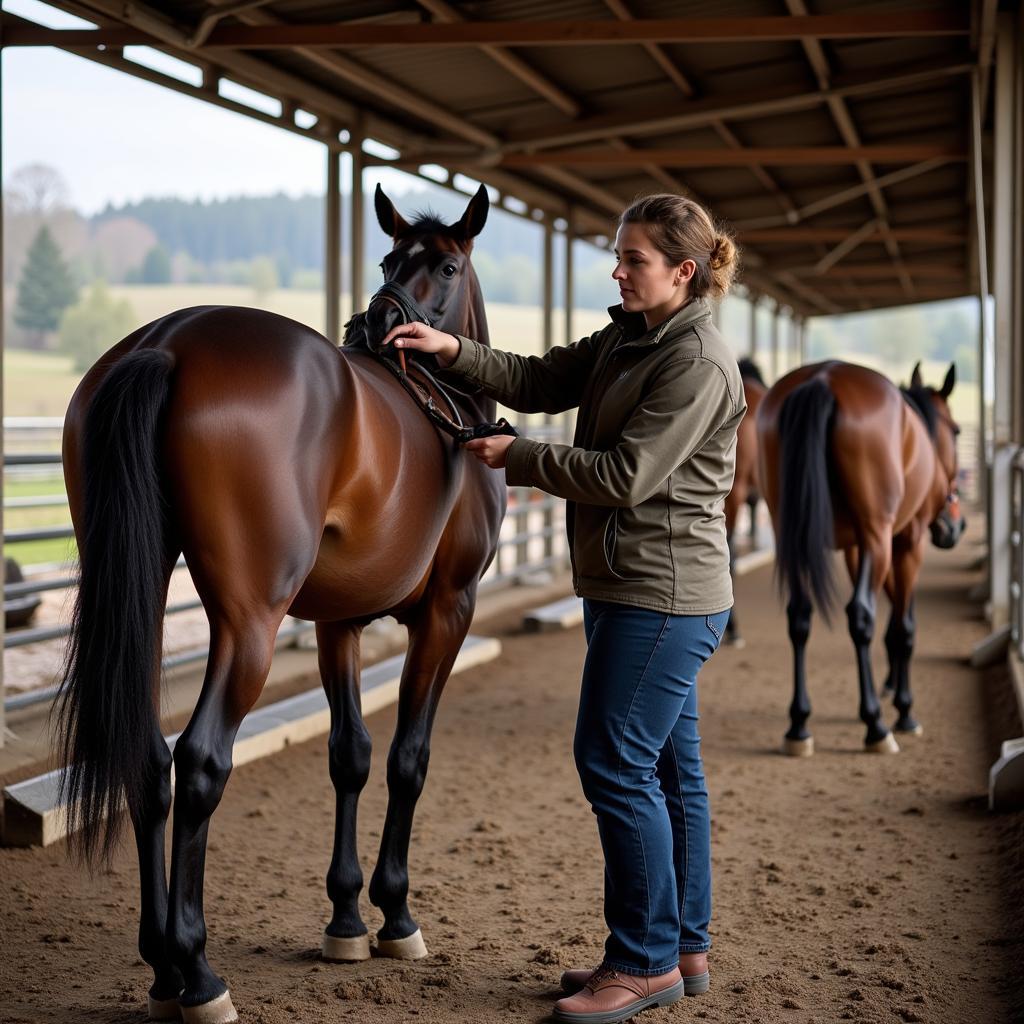Horse racing, a sport steeped in tradition and adrenaline, relies heavily on the strength and agility of its equine athletes. But what happens when a horse can no longer compete? The issue of “replacement horses” is a complex one, raising concerns about equine welfare, ethical treatment, and responsible retirement. This article delves into the world of replacement horses, exploring the reasons behind their introduction, the industry practices surrounding their care, and the initiatives aimed at ensuring a brighter future for these dedicated animals.
 Replacement Horses in a Paddock
Replacement Horses in a Paddock
Understanding the Role of Replacement Horses
In the high-stakes world of horse racing, owners and trainers often seek to maintain a competitive edge. When a horse experiences injury, underperforms, or simply ages out of peak racing condition, it may be replaced by another, younger, and potentially more promising athlete. This practice, while common, raises important questions about the welfare of the horses involved.
It’s crucial to understand that “replacement” doesn’t always imply discarding the original horse. Responsible owners and trainers prioritize the well-being of their animals, often transitioning them to breeding programs, equestrian disciplines, or peaceful retirement. However, the lack of consistent regulations and oversight within the industry can lead to instances of neglect or even mistreatment.
Factors Leading to Horse Replacement
Several factors contribute to the need for replacement horses in racing:
- Injury: High-impact training and racing can lead to injuries that hinder a horse’s performance.
- Performance Decline: Horses, like all athletes, experience peak performance periods. Natural decline can necessitate a change in career path.
- Breeding Potential: Successful racehorses are highly sought after for breeding, often leading to early retirement from the track.
- Financial Considerations: Maintaining a racehorse is expensive. Owners may replace underperforming horses to minimize financial losses.
The Importance of Ethical Retirement and Rehoming
 Equine Rescue Sanctuary
Equine Rescue Sanctuary
The transition from racing can be challenging for horses accustomed to rigorous training and a fast-paced lifestyle. Ethical retirement and rehoming initiatives play a vital role in ensuring these animals receive the care and attention they deserve. Reputable organizations prioritize:
- Thorough Veterinary Care: Addressing any lingering injuries or health concerns is paramount.
- Gradual Transition: Allowing horses time to adjust to a less demanding routine is crucial for their well-being.
- Finding Suitable Homes: Matching retired racehorses with owners experienced in their care is essential for successful rehoming.
Ensuring Transparency and Accountability
Transparency and accountability within the horse racing industry are essential to safeguarding equine welfare. Initiatives that promote these values include:
- Traceability Programs: Tracking horses throughout their racing careers and into retirement helps ensure their whereabouts and well-being are documented.
- Stricter Regulations: Implementing and enforcing regulations regarding horse care, training practices, and retirement options can help prevent neglect and abuse.
- Public Awareness: Educating the public about the challenges faced by replacement horses can encourage support for ethical practices and rehoming initiatives.
The Future of Replacement Horses: A Call for Compassion
The use of replacement horses in racing is likely to continue. However, by prioritizing equine welfare, promoting ethical retirement practices, and advocating for greater transparency within the industry, we can create a future where these magnificent animals receive the respect and care they deserve. Supporting organizations that rescue, rehabilitate, and rehome retired racehorses is a tangible way to make a difference in the lives of these dedicated athletes.
FAQ
What happens to racehorses that are no longer competitive?
The fate of racehorses varies. Some are retired to breeding farms, others transition to different equestrian disciplines, and some enjoy peaceful retirements. However, the lack of consistent industry regulations means not all horses are treated ethically.
Are there organizations that help retired racehorses?
Yes, numerous organizations specialize in rescuing, rehabilitating, and rehoming retired racehorses. These organizations work tirelessly to find loving homes for these animals and ensure their well-being.
How can I support ethical treatment of racehorses?
You can support ethical treatment by supporting organizations that advocate for horse welfare, promoting responsible breeding and racing practices, and educating yourself and others about the challenges faced by racehorses.
Need More Help?
If you have concerns about a specific horse or want to learn more about horse care and ethical practices, please don’t hesitate to contact us. Our team at Justus Horses USA is dedicated to providing accurate information and resources to horse owners and enthusiasts. You can reach us at Phone Number: 0772127271, Email: [email protected] Or visit us at: QGM2+WX2, Vị Trung, Vị Thuỷ, Hậu Giang, Việt Nam. We have a 24/7 customer support team.